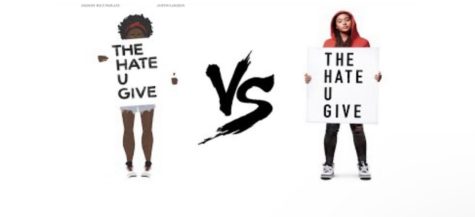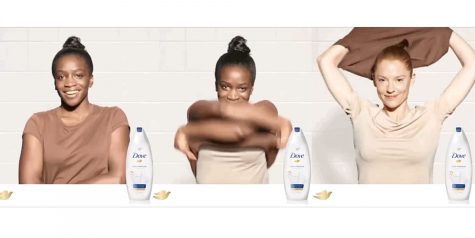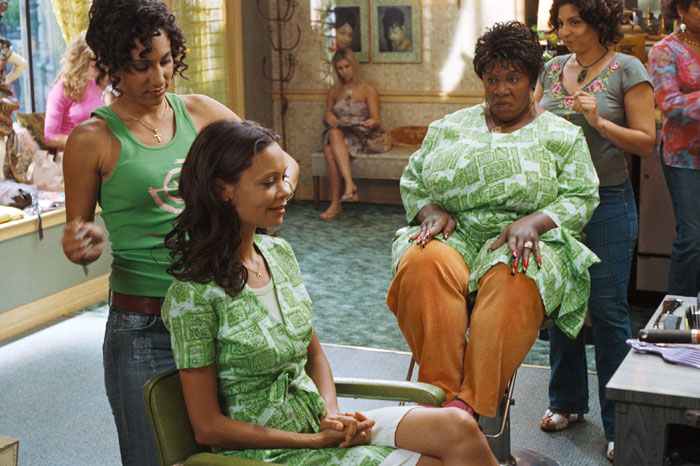The media fuels prejudice against darker-skinned black women
January 21, 2022
Armani, a model/actress and Houston Texas native, started off in theater productions at the age of seven. She grew up loving her dark skin. In her household, her melanin was celebrated as most of her family members shared that trait. But some of her family, specifically her young cousins, felt differently. She recalled, “They would come to our house for the summer. And of course, you know, everybody’s the same as you get teased, you know, everybody’s 10 years old, nine years old, of course you’ll get teased about being the darkest one in the room.”
She and other talented women would soon examine that anti-blackness would infiltrate a small part of her family life to a widespread practice within her career field. And the reason behind this stems far deeper than just a few ignorant individuals. History has cultivated to enact colorism as a wide-spread practice.
Take a look at a media production that has a black female as a lead, or any role at all. Examine the skin tone and features of that black woman. She’s most likely slim, has loose curly hair, and light-almond skin. She’s the it girl, the love interest, the one everyone fantasizes about. Finally, black women have garnished the representation they deserve. Right?
Inclusion of black women within the media has come a long way. Some of the top musicians and actresses are of black. But the types of black women represented within the media are not an accurate representation of the population of black women.
Oftentimes, lighter-skinned women are casted in TV shows, movies, music videos and ads. And when darker skinned women are brought to the forefront, they are not represented in a positive light. In fact, darker skinned black women are demeaned and marginalized in all industries of media. This has an adverse effect on society and the way darker skinned black women are viewed and view themselves. But the exclusion of darker-skinned women is not sudden; it is rather derived from a caste system.
Longstanding History
White Slave owner William Lynch delivered a speech on the bank of James river in 1712 to the Virgina Colony slave owners. His thousand mile journey was an important one. He shared his knowledge of making the perfect slave populationand his speech lectured to keep slaves under control, how to break and divide them. A crucial step in this process was to separate slaves based on “color or shade.” Slave masters were urged to create system that differenciated as such: “ Dark Skin Slaves vs. the Light Skin Slaves and the Light Skin Slaves vs. the Dark Skin Slaves.” To ensure the continuation of this color based system, he advised cross breeding. In his own words, “Cross-breeding n*ggers means taking as many drops of good white blood and putting them into as many n*gger women as possible, varying the drops by various tones that you want, and then letting them breed with each other until circle of colors appear as you desire.” This formulation spread throughout slave plantations in the Americas. And as this formulation spread, the ideology of colorism began to arise.
To maintain the ideology of white superiority, they showcased favoritism within the plantation. Lighter skinned slaves were often the product of rape between white slave owners and slaves. They were oftentimes treated far better than darker skinned slaves. They would be given easier jobs such as house duty, rather than having back breaking work on the plantation. This fueled a disconnect between a group of people that were virtually the same, but just different shades of black.
Along with this, “physical traits such as skin color, eye color, hair texture, nose shape, and lip prominence became powerfully loaded symbols of beauty, merit, and prestige.” Light skin and eurocentric features were deemed worthy and desirable as it was closest to the true white man. In essence, “black skin became the symbol for all that is bad”, and whiter skin was favorable. For generations to come, the “bad is black effect” would persist throughout the black community and society as a whole.
This is shown through the 2010 doll experiment with American children conducted by professor Margaret Beale Spencer, a child development researcher. They were presented with dolls of multiple skin tones and were asked to choose which they’d prefer. The results: “there more White and fewer Black children than expected who selected the two darkest skin tones and there were more Black and fewer White children than expected who selected the two lightest skin tones (note: 1 Black child and 1 White child did not answer the question) a) Two darkest skin tones i) Black children – 51.43% (n=18) ii) White children – 85.71% (n=24)”. From a young age, we are conditioned to gravitate towards those of a lighter complexion. This ideology then forms into qualities of socially acceptable versus non acceptable candidates.
Those of a darker skin complexion are often perceived to be immoral, dangerous, or aggressive. There is a ”psychological preoccupation with skin tone that has consequences for person percievers and persons perceived.” The effects that this has on darker skinned women is adverse. The objectives of femininity and beauty are associated with whiteness. The “more Eurocentric a Black woman appears to be, the more attractive and feminine she appears” as African features are perceived as masculine, which is the complete opposite of society’s beauty standard.
An anonymous NYC iSchool student has had a fair share of negative experiences involving colorism and self-image. She said, “I’ve experienced some colorism at school and sometimes at home. Colorist remarks/statements were often disguised and I was not able to tell when I was younger. I’ve been in friend groups before feeling kind of left out. This is specifically elementary school, where kids would just say/do rude things. I remember only having white or lighter skinned dolls growing up because there were few dolls that looked like me. I did not realize the effect this had on me until I grew up. In middle school, I would use Snapchat mostly for the filters because I believed it made me ‘look better’ when all it did was change my features and make me look lighter.”
Another NYC iSchool student, who has also chosen to stay anonymous, reminisces about colorism within her own household: “Looking back to the early summer days of my childhood, I am burdened with the memory of my mother refusing to let me out for certain hours of the day because she feared I “would get too dark.”
Ajayah Mathews, a sixteen year old New York City high school student, has faced daily struggles of societal pressures to conform to the European beauty standards that are pushed heavily in her hometown of the Bronx. Mathews admits, “I got bullied about being too dark and the texture of my natural hair. I have days where I want to get a perm and getting straighter/curly hair.”
Its been hundreds of years since the establishment of slavery and more than a century since its abolishment. We have movements that promote black people to be seen in a positive light. So, why is it that darker skinned women are suffering from constant bullying? Colorism against darker skinned women is well present within the home life and society, but what most fail to realize is that it is also strategically implemented within the media. The media has the ability to influence the mindset of people and warp the perception of others. Tv shows, movies, advertisements, and music videos promote prejudice against darker skinned women.
Movies/T.V shows
Spike Lee’s cultural masterpiece, “School Daze”, set at a fictional historically black college, Mission College, showcases the negative stereotypical roles of darker skinned actresses. They were portrayed as unattractive by being left dateless on Friday nights, and they were also portrayed as lower class and bitter. Whilst lighter skinned actresses played the role of the popular girls: classy, attractive and happy.
The 2007 movie “Norbit,” starring Eddie Murphy is about his awful life with his verbally, physically and emotionally abusive wife and his desire to reunite with his true childhood love. His wife is an overweight darker skinned woman who often has violent fits of rage.
Amandla Stenburg, a biracial- half black, half-white woman, has been consistently acted in roles in which she is the black girl main character in movies such as: “Everything, Everything”, “Where Hands Touch”, “The Hate You Give”. She is just black enough but not too black to play the love interest of a white man.
 The famous Disney channel TV series “K.C. Undercover” revolves around the everyday life of a family of African American spies. Both parents are black and so are the siblings. But Zendaya, the leading star of the show, is biracial, and has more eurocentric features. She does not look like the average black girl.
The famous Disney channel TV series “K.C. Undercover” revolves around the everyday life of a family of African American spies. Both parents are black and so are the siblings. But Zendaya, the leading star of the show, is biracial, and has more eurocentric features. She does not look like the average black girl.
In The French Prince of Bel-Air, Aunt Vivian was depicted by Janet Hubert. She was later replaced for a lighter skinned actress, Daphne Maxwell Reid, after three seasons on the show. Janet was less palatable due to her outspokenness. Having a lighter skinned actress to play the role of a quiet housewife of a wealthy judge was more so typical and put the focus of the show back on the main character, Will Smith.
Tisha Campbell, a lighter skinned black woman, plays the role of the love interest of Martin Lawrence in the show Martin, Gina. Her best friend is Pam (Tichina Arnold) and she is made fun of and made to seem as undesirable. She is of a darker skin complexion.
Christal Luster, a thirty one year old full time actress located in the Chicagoland area, works as a full-time actress, creative director and content curator. She’s worked as a part of the crew as a PA, 1st AD, Director, EPK Producer and Set Photographer. She said, “I have had a few “angry” black woman auditions, but I am pretty selective in my auditions. I want to change the narrative. I’ve been fortunate to work with directors who feel the same way.”
Mellisa Effa, an Atlanta, Georgia native and creator of a web series called Hard Medicine, has had an awkward experience while trying to break into the acting industry. She said, “I was taking this acting class in Los Angeles. This was some years ago…. I felt when I was growing up, like how I felt like when I was in high school, um, feeling a sense of like being overlooked, like the teacher, what kind of point out, um, people that they thought was like, pretty like, they’re like, oh, you’re super pretty. And like this isn’t that, um, you’re, you’re like a leading lady and like, would say that to certain women in the class. And then like, we would never say it to me. Um, so stuff like that in the class, which is the class, the teacher was a good teacher at the end of the day, but like those like methods, um, I don’t think were the most healthy, um, you know, in terms of like making people feel like they’re in a safe environment, but for me, those types of things triggered me.”
These are all fairly popular movies and television shows that we all probably know of or have binged watched on Saturday nights. But these concise forms of anti darker-skinned black woman propaganda only fuel both prejudice of darker-skinned within the entertainment industry and society.
Commercials and Advertisements
In 2017, Dove received widespread controversy as they released a highly insensitive comercial. The ad pictures a darker skinned black woman wearing a brown shirt, which she then transforms into a pale white woman wearing a white shirt. The melanin of the balck women symbolizes dirt that the Dove brand body wash can remove. A dove statement on Twitter apologizes and admits that they “missed the mark in representing women of color rightfully.” 
Also in 2017, an ad released by popular skin care brand, Nivea, featured a skin lightening agenda. The ad features former Miss Nigeria Omowunmi Akinnifesi using a cream that visibly lightens her skin and she closes off with the phrase “Now i have visibility fairer skin, making me feel younger.”

Twenty six year old Aimée Okotie-Oyekan has a career list. She is a land use and transportation planner, environmental and climate justice organizer, and artist. She’s modeled in music videos, beauty and magazine editorials, African cultural night fashion shows, and commercial shoots. Whilst auditioning for an agency and being rejected twice, she’d come to realize her skin tone may have been a deciding factor. She says: “it was almost like they were changing the goal post, so I was never the right fit. In another instance, a photographer was setting up a shot and asked all of the female models to be in it and left me out.”
Music Videos and Lyrics
In Dani Leigh’s controversial song “Yellow Bone”, she brags about light skin superiority and her being the preferred love interest of her past boyfriend, Da Baby. She chants, “Yellow bone”, a term used in reference to lighter skinned black women, and continues with, “that’s what he want.”
In Lil wayne’s 2010 hit, “Right Above It” featuring Drake, Wayne raps: “beautiful black woman, i bet that b**** look better red.” The term red is also a term to describe a lighter skinned black person.
A music video collaboration for Da Baby and Yo Gottis’ 2021 track, “Drop”, faced backlash for the lack of diversity within the video shoot. Racially ambiguous video vixens appeared alongside both actors, dancing near a pool. Not one darker skinned black woman was in sight.
Sonesha Da Don, an aspiring female rapper from The Bronx, acknowledges the hardships she’ll face while trying to break into the music industry. She says, “lighter skinned girls are ruling the industry right now Like Cardi B, Megan Thee Stallion, Saweetie, Mulatto, girls like that. That complexion gives them a leg up compared to all the darker skinned rappers like Dreezy who you might not even know, Asian Doll who you might not even know, or you might know her because she’s always in some drama… darker women in the game have to work harder. And the men in the music industry don’t make it any better with the light skin this, light skin that in their music.”
Armani spoke of a night club encounter involving anonymous celebrities. She says, “ there’s one experience. I won’t, I won’t name drop, but there is, there are some celebrities that I have been, um, out with guys and I’m speaking of males, um, that, and I mean, alien celebrities, like very well-known, um, you’ll go to, they need, you know, guys, they need girls, they need girls at their party. That’s what gets people to the party. So they’ll say, okay, I want all the, I want 20 women up here with me in my section.”
Emotional Impact
Dark skin is pushed as undesirable in all aspects of media and in real life, and the young women affected by colorism have a lot to say about it.
Medina, a New York City high school student says, “It’s overwhelming because no matter what we do to make ourselves look proper will never be enough.”
Madison Davis expressed, “It makes me feel sad because light skin woman get a good rep when dark skin women don’t.”
Charla, a freshman from a Florida high school says, “It makes me feel that we are not equal. I don’t see the sense of why darker-skinned women are treated so differently…we are talented too but get pushed to the corner.”
Lincoln Thorpe, a young man from also from Luella Highschool in Atlanta, Georgia, sympathizes with darker-skinned women that Georgia says, “They are beautiful, they should be celebrated just like any other lighter-toned woman, #weloveourmelaninqueens.”
Mellisa Eno Effa has taken a more hands on approach in terms of diversifying her strain of media. “I am passionate about showcasing healthy black relationships, that showcase dark skinned black women being desires, being the love interest. The pictures and images we see stay in our mind. If we can create content that our children are seeing these positive images then we’re gonna see a shift in our community.” Her web series, Hard Medicine, will aim to captivate the talents of not only black women but black people as a whole.
To bring forth a healthy change, Armani left a message towards those higher up within media industries; “representation matters. I think they know that though. And I think that’s probably why they don’t use this. Um, but representation matters and black women, no matter, but you actually are the blueprints. So if you want to sell your stuff, you should get a black woman.”
